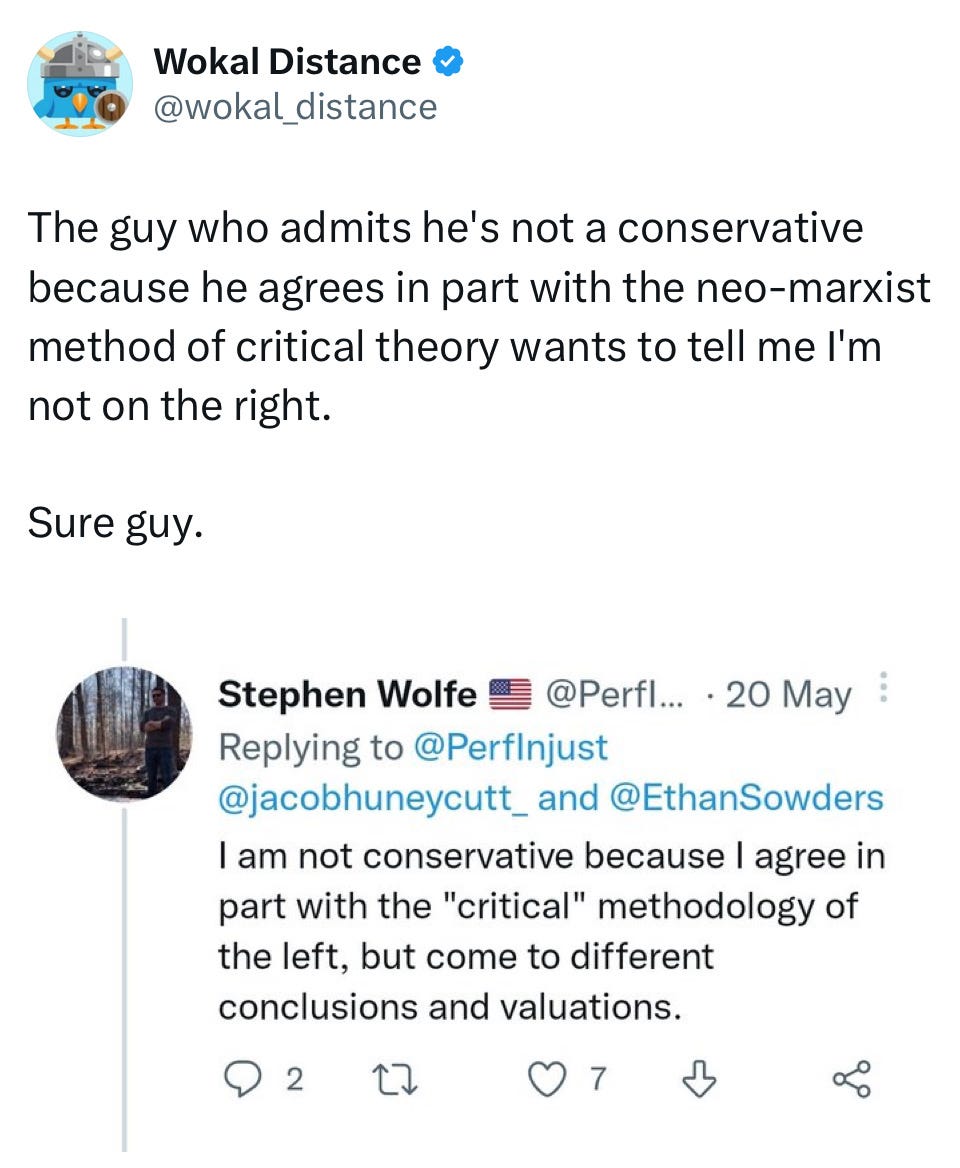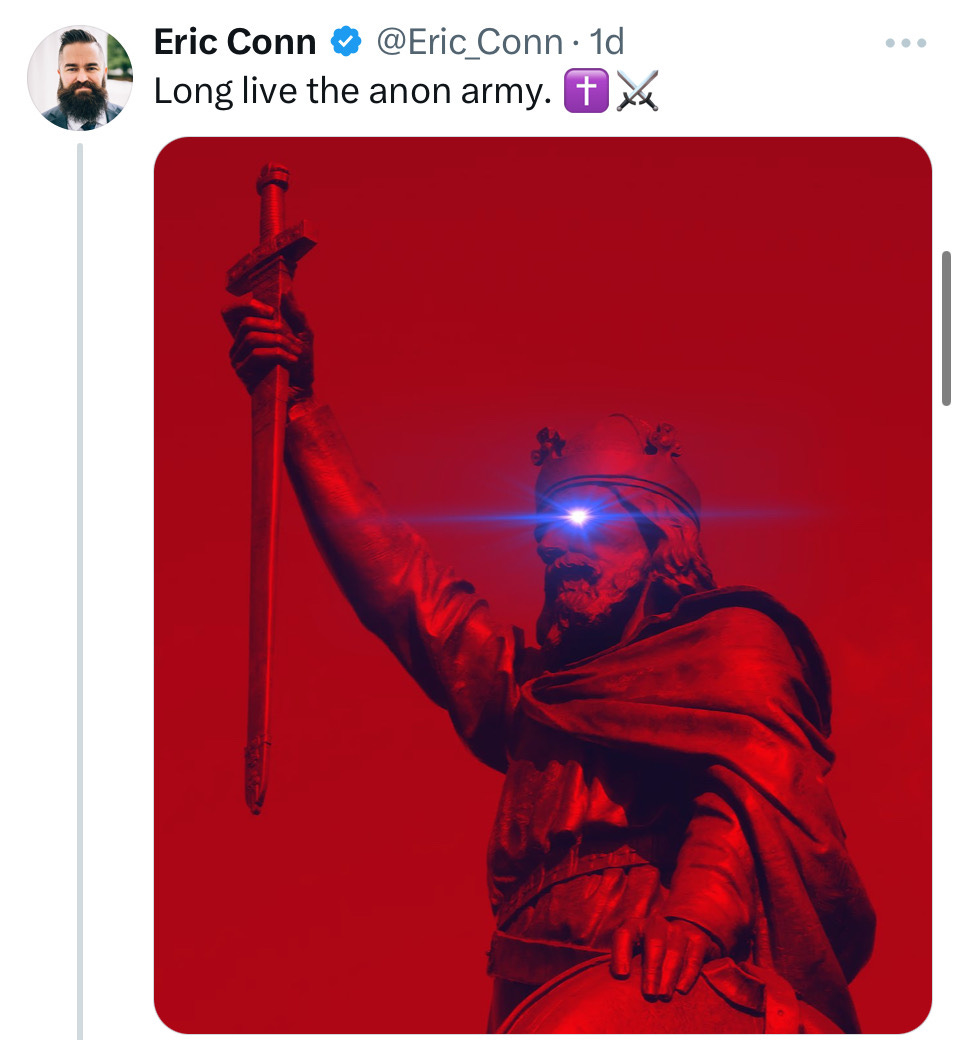Some Thoughts on the Woke Right: A Story of Betrayed Allegiances
In 1933, a desperate Germany welcomed Adolf Hitler’s assurances that he would restore the country’s dignity and safeguard its Christian foundations. “The National Government regards the two Christian confessions as the most important factors for the maintenance of our people,” Hitler proclaimed, cloaking his ambitions in religious language. His words resonated with a people weary of cultural fragmentation and economic despair, many of whom believed he was God’s instrument for national revival.
What followed was a tragic compromise. The Deutsche Christen movement, a faction of German Protestantism, eagerly aligned with the Nazi Party. They embraced policies that blended Christianity with racial nationalism, rewriting theology to fit Nazi ideology. The Old Testament was dismissed as a “Jewish text,” and Jesus was reimagined as an Aryan figure. The gospel’s message of unity in Christ was replaced with a narrative of racial purity and cultural superiority.
Dietrich Bonhoeffer and the Confessing Church stood as rare exceptions, resisting these distortions at great personal cost. Yet, the broader church’s capitulation proved catastrophic, allowing the regime to co-opt Christianity as a tool for division and oppression. Hitler’s early promises of Christian solidarity were nothing more than a ruse—a calculated bait-and-switch to secure the church’s allegiance while hollowing out its core.
This history offers a haunting parallel to the “woke right” of today. Leaders like Stephen Wolfe, who claim to champion Christian values, risk following a similar path. They wrap their rhetoric in the language of faith and tradition, but their methods betray an agenda more aligned with critical theory than with the gospel.
Distortion of Christianity
Stephen Wolfe’s The Case for Christian Nationalism presents itself as a blueprint for restoring a Christian society. But behind its lofty ideals lies a framework borrowed from the very ideologies it claims to oppose—and he admits it. Wolfe has openly embraced critical theory’s analytical tools, stating, “I will not reject a ‘critical’ approach to social phenomena. There are subtle hierarchies of power, some natural and proper, and others artificial and absurd.” He also noted in another post that he recognizes that this embrace of critical theory means he’s not a conservative.
Critical theory, rooted in Marxist thought, seeks to expose and dismantle societal power structures. Thinkers like Herbert Marcuse argued that hegemonic norms perpetuate oppression, and liberation requires deconstructing these norms. Marcuse’s concept of “liberating tolerance” called for silencing the oppressors to empower the oppressed. Wolfe’s approach mirrors this method but with the targets reversed. For example, instead of focusing on racial minorities or women, Wolfe and his allies frame straight white men as the new oppressed class under a hostile cultural hegemony.
One of Wolfe’s associates and the Ars Politica podcast co-host took this framework to its logical extreme, advocating for “White AntiFragility”, in response to Robin DeAngelo’s infamous book “Whife Fragility”. In a provocative article, he argued that white people should embrace the accusations of critical race theory and use them to build a sense of pride in their heritage. “If your white skin and genes confer the guilt of your ancestors,” he wrote, “then they also confer the pride of your ancestors…their accomplishments, victories, virtues, rights, liberties, heritages, and more.”
This rhetoric, eerily reminiscent of the Deutsche Christen movement, reveals the bait-and-switch at the heart of woke right ideology. A Motte and Bailey. Wolfe’s vision begins with an appeal to the Christian, who’s rightly displeased with the Left (the motte), but quickly shifts focus to ethnic and cultural “nationalism” (the bailey). The Christian label becomes a shield, deflecting criticism while advancing an agenda that prioritizes racial and cultural grievances over gospel truths.
The Devil His Due
To be fair, the woke right is not entirely wrong in identifying real cultural biases. In recent years, diversity, equity, and inclusion (DEI) initiatives and affirmative action policies have often targeted white men in ways that feel unjust. A 2019 Princeton study revealed that Asian-American and white applicants were significantly disadvantaged in college admissions compared to Black and Hispanic students with similar credentials. The Supreme Court’s recent decision striking down race-based admissions policies underscored the systemic nature of this issue.
Corporate DEI training programs have added to the resentment. Coca-Cola faced backlash for a session urging employees to “be less white,” associating whiteness with arrogance and ignorance. In the media, straight white men are frequently depicted as villains or buffoons, reinforcing a narrative of cultural irrelevance.
These grievances are not unfounded. They highlight the dangers of the woke left’s identity politics, pervasive in our country. But adopting a critical theory framework to combat these issues does not solve them. It merely relocates the problem, perpetuating the same cycle of grievance and division. This must have no place in the Church of Christ.
Wolfe and his allies respond to leftist wokeness by creating their own version of it, complete with group identities, victim narratives, and racially exclusionary rhetoric. In doing so, they mirror the very ideologies they oppose, undermining the gospel’s call to unity and reconciliation.
False Love
One of the most concerning aspects of woke ideology (on both sides) is its emphasis on an abstract, ethnic loyalty that supersedes the gospel’s command to love one’s neighbor. Scripture provides no support for a generalized love of one’s race that ignores the individuals God has placed directly in our lives.
In Luke 10:25-37, Jesus’ parable of the Good Samaritan redefines what it means to love one’s neighbor. When the lawyer, seeking to justify himself, asks, “And who is my neighbor?” Jesus tells a story of a Samaritan—a hated outsider—who shows mercy to a wounded Jew. The Samaritan’s love was not abstract or theoretical or group identity-based ; it was tangible, immediate, and costly. Jesus concludes, “Go and do likewise.”
The woke vision, however, promotes a kind of love that is distant and impersonal. It suggests prioritizing the interests of one’s racial group over the needs of one’s literal neighbor. But as Augustine reminds us, “He that loves his neighbor, loves his God.” Biblical love is not based on shared ethnicity but on proximity and need. If you cannot love the neighbor who lives next door—who may not look like you or share your cultural background—but instead claim allegiance to a stranger who happens to share your race, you have misunderstood the gospel.
This false love is not only unbiblical but also self-serving. It allows people to avoid the hard work of building relationships and practicing humility. True Christian love transcends these boundaries, binding people of every tribe and tongue into one family through the Spirit of God.
Consider the example of Pastor Kofi Adu-Boahen, a Ghanaian man faithfully serving as the pastor of Redeemer Church in Medford, Oregon. He resides in the United States legally, is married to an American woman, and has American children. Above all, he is a Christian—a friend of Christ and a brother in the faith—who has broken no law. Yet, according to Twitter user "@Skippy_DCM," an ethno-nationalist advocate among the so-called "anon army," Pastor Adu-Boahen “does not belong here.” Skippy writes: “You do not belong in these United States because you are a foreigner. That takes logical precedent over your ideology. Your culture, home, heritage, history, kin, etc., is all elsewhere.”
This is a vile and glaring example of the rotten fruit produced by such a sinister political ideology—fruit that is entirely unrecognizable to a Christian walking in the Spirit and bearing the gospel's fruits of love, joy, and peace. Dr. James White aptly calls out the wickedness of this sentiment in a video and on Twitter, remarking: “…you forget everything in the Bible. Just... poof. Astonishing. And vile, because these folks use the faith as a cover for their bigotry.”
Cult Tactics of Wokeness
The woke right and woke left also share a disturbing resemblance to cults. Both movements demand absolute loyalty, enforce ideological conformity, and ostracize dissenters. In the woke left, adherence to concepts like “anti-racism” and “intersectionality” determines one’s moral standing. Deviate from the orthodoxy, and you risk being labeled a racist, a bigot, or worse.
The woke right operates similarly. Those who question Wolfe’s vision of Christian nationalism are dismissed as “globalist shills” or “effeminate normies”, “slanderers of the brothers.” Online spaces dominated by woke right figures often echo the groupthink of cults, where in-group language reinforces solidarity and dissent is met with scorn. Terms like “based” and “red-pilled” serve as badges of belonging, while critics are derided with slurs.
Another common tactic is for leaders to position themselves as beyond criticism. A prime example of this among the so-called “woke right” is their popular online slogans, such as “No Enemies to the Right” or “No More Brother Wars.” These phrases are often promoted by individuals claiming to be the furthest right of anyone else. What’s the goal here? To elevate themselves above critique and position themselves as the ultimate authority—untouchable and unquestionable. By doing this, they attempt to monopolize what it means to be right-wing, good, and true. If you dare to challenge them? You’re accused of slandering a Christian brother by their “anon army” and called to repent of your supposed wickedness. This behavior mirrors the tactics of cults: demanding absolute submission to their leaders, ideologies, and dogmas.
The most concerning problem for the Christian: this cult-like behavior usurps the role of the Holy Spirit and Scripture in guiding believers. Loyalty to the group takes precedence over loyalty to Christ, and ideological purity replaces biblical fidelity. The result is a distortion of Christianity that prioritizes cultural identity over spiritual transformation.
Unity in Diversity
The gospel offers a radically different vision from the divisive rhetoric of the woke right and left. It does not seek to erase national or cultural distinctions but to redeem, purify, enhance, and unite them under the eternal Lordship of Christ. Revelation 7:9 paints a picture of a redeemed people from “every nation, tribe, people, and language” worshiping together before the throne of God. This is not a monolithic state but a celebration of God’s creativity and the unity found in His Spirit.
Jesus’ Great Commission commands His followers to “go and make disciples of all nations” (Matthew 28:19). Yet many proponents of Christian nationalism speak little about evangelism. They envision a Christian nation built through cultural dominance and legal reforms (both good and necessary, yes), but neglect the heart of the gospel: transformed lives. How can a nation be Christian if its people have not embraced Christ in faith? How can moral reforms last if the Word (Logos) is not within the hearts of the people?
It must be remembered: the kingdom of God is not established by the sword but by the Spirit.
Furthermore, the New Testament consistently challenges earthly allegiances. In Matthew 12:48-50, Jesus redefines family as those who do the will of God. In Luke 14:26, He demands that His disciples love Him more than even their closest relatives. These passages do not downplay the value of family, rather they emphasize that our primary identity is found in Christ, not in race, “blood and soil”, nationality, or culture.
As Augustine wrote in The City of God, “Two cities have been formed by two loves: the earthly by the love of self, even to the contempt of God; the heavenly by the love of God, even to the contempt of self.” The Christian’s ultimate allegiance is to the City of God, where love of God and neighbor transcends all earthly divisions.
The Path Forward
Both the woke right and woke left distort the gospel for political ends. The woke left reduces Christianity to social justice activism, prioritizing systemic reforms over personal repentance. The woke right replaces the gospel’s call to unity with a narrative of ethnic grievance. Both movements are demonic in origin, undermining the church’s witness and sowing division among believers.
True Christian nationalism begins not with crusader-esk political campaigns but with the Great Commission. The gospel transforms nations by transforming hearts, one soul at a time. It unites diverse peoples under one faith, one Lord, and one Spirit, creating a kingdom that transcends all earthly allegiances.
The woke right and woke left offer only counterfeit, temporary “solutions” to the world’s problems—to the problem of human sin. But the gospel offers real, lasting, and fulfilled hope: love and reconciliation in Christ. Let us reject the false promises of wokeness on both sides and recommit to the transformative power of the gospel. That is how nations become Christian. That is how the world is changed.





